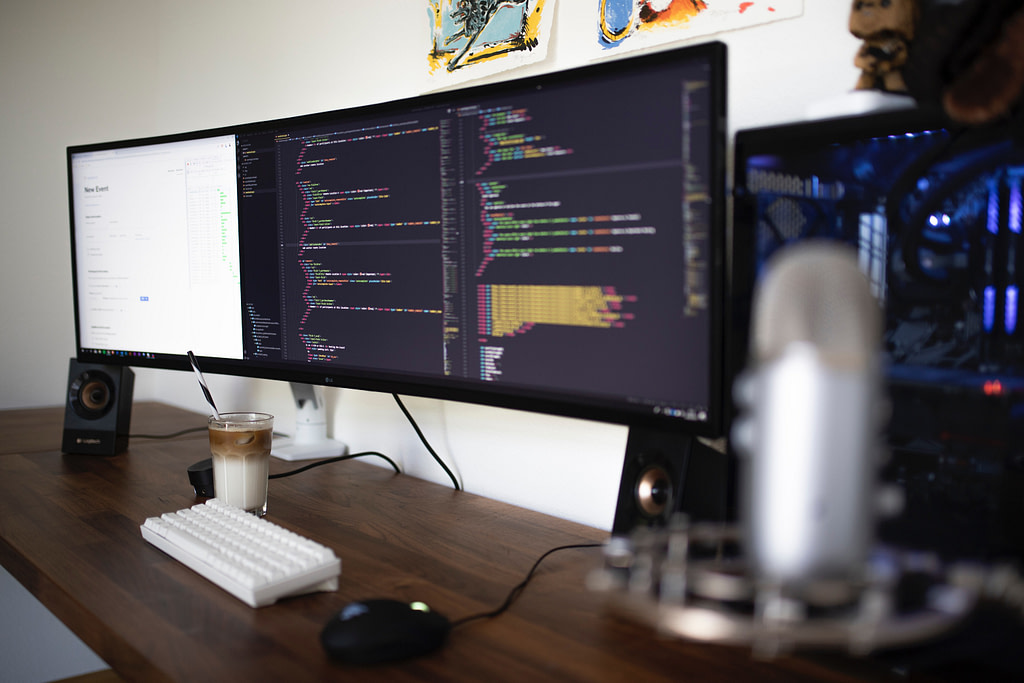It had to happen. You’ve finally reached the point when it’s time to choose the right technology for building your product. Even though building digital products is not really about technology (I mean: really), the choice still needs to be made. And to make a good decision, it is worth checking out your options.
In this article, we will cover building back-end services with Node.js – in a simple, business-oriented way and without getting deep into technical details. You will learn if it fits your requirements and if it will help your business grow. Ready?
Is node.js a front-end or back-end tool?
Let’s start with a few words about the front-end and back-end in general. So, front-end development is about the visual side:
- structure (sections) of the page,
- content (text, images, colors, etc.),
- buttons you can click,
- forms to fill out,
- animations, pop-ups.
Basically, anything a user sees, has been developed with front-end tools.
Back-end technologies, in turn, deal with the logic behind the scenes. For example, if you try to log in to Facebook, your email address and password must be verified and matched with the right account. You can’t see it happening, but it’s being processed on the server-side.
So if you’re wondering if Node.js is front-end or back-end related, the answer is simple: it is a back-end technology, mostly used in web development.
But it doesn’t end here! Node.js is a framework based on the JavaScript programming language. Even Node’s in-depth description states it is a JavaScript runtime environment. And since front-end developers often use JavaScript, it turns out everyone understands the same language. So, although the Node.js framework is used to build back-end services, it is much easier to cooperate with the front-end side. This makes the work more consistent.

Why use Node.js?
The popularity of Node.js stems from the fact that it works well for both small and large applications. This makes Node.js one of the most scalable app development tools and significantly expands its usability.
Want to see some real-world examples? No problem!
One example of an app that uses Node is Netflix. You most likely realize this app has a vast library of movies and millions of users. Yet, it runs fast – and on many different devices.
At the same time, thanks to Node.js, you can also create a simple calculator that can be opened in a browser or on your phone. Developing the calculator app doesn’t require numerous configurations – they are redundant with such a small program. That’s precisely the point! Node.js allows for detailed configuration and advanced features, but in the case of building a simple app, you can just omit them and save time.
Here, you can find some more examples of popular companies using node.js.
Benefits of Node.js for back-end development
Node.js is best suited for the software development of real-time apps (RTAs): games, chatbots, and streaming. But it’s also great for most applications that need to run in a web browser or mobile device. Here are some benefits of node.js:
Quick MVP development
Minimum Viable Product (MVP) is created to prove that there is a product-market fit. It comes after validating your idea with a proof of concept and/or a prototype. It’s still a product with a limited number of functionalities, but at this stage, they should be sufficient to attract paying customers
Node.js is ideal in this situation. How so?
- It is an open-source application framework – its users can develop it, so many ready-made solutions are available online. Node also has a built-in tool that makes installing these solutions easy – Node package manager (npm). Therefore, the development of essential functions is accelerated, saving you time (and money, naturally!). The sooner you are able to give your app to users, the sooner you start getting feedback and will be ready to make money with this product.
- While Node was being designed, this web application framework’s developers focused on making it less complicated. The goal was to make it easier to work with Node.js than with other programming languages. As a result, the development time of the application should be shorter.
Easy to make changes
The main benefit of Node.js is the ability to implement changes to the application effortlessly. New features do not require changes to the rest of the application. Thanks to this:
- Adding new modules and managing dependencies between the modules in the app is easy and intuitive – thanks to that, adding new features is fast.
- Your application can grow gradually. You don’t need to have all features and ideas planned from the start. Of course, it’s crucial to plan as much as possible – refining your idea is essential. But… is it even possible to have everything planned in the early stages of a project?
User convenience
No one likes it when an application stutters. The Node.js community knows this all too well, so they are continuously working on making this technology run faster. Additionally, incredible speed is in the nature of Node.js, as it’s been developed to speed things up in the online world. With Node, you can rest assured your product will match the standards of apps created by even the largest companies with a considerable budget.
What else? Node.js is built on top of the V8 JavaScript engine used by most browsers. As a result, your users will be able to use the application on their favorite browser, whichever one that is. It’s a detail, but it can matter a lot to some users.

When is Node.js not the best choice?
Although you can implement almost any idea using Node.js, it doesn’t mean that it will always be the best choice. Sometimes it’s good to choose a technology that fits your requirements better. Sounds vague? To make it more transparent, let’s describe a few potential situations.
A large amount of computation or a desktop application
Let’s start with the most straightforward thing: pure Node.js won’t be able to create a native desktop application (for PC or notebook) because it only works in a browser. There are tools that make building desktop apps with Node possible, but pure Node.js can’t achieve this.
Let’s move on to the less apparent factors.
If your application:
- has to do many calculations,
- perform a massive number of operations,
- or have complex rules
then it’s possible to develop it with Node; however, it takes plenty of time to get the app to work flawlessly. So, here comes the question: why take the risk when you can use better options?
Unfortunately, Node.js doesn’t have certain safeguards that other programming languages have. Therefore, even though it can perform many operations, calculations, etc., it’s also prone to some errors – more than other programming languages, for example, Java. That means developers have to put much more effort into preventing mistakes. And as you know, developers are only human.
The above might be fine in most cases, where an error would only cause failure in adding some data or in displaying a message properly, etc. But this factor is crucial when developing an app that could have a tremendous negative impact on customers if anything goes wrong – for example, a complex banking app. Just imagine customers losing their money!
In all these cases, you might want to use Java. Here is a comparison: Node.js vs. Java.
The fastest and most inexpensive application creation
Are you worried that your budget is insufficient to build an application? We might have a solution for that as well!
In that case, you can choose the technology with the fastest development time on the market – Ruby on Rails (RoR). Yes, it comes out on top even when compared to Node.js. However, we must mention that this language has some drawbacks. You can read more about it in our article: Ruby on Rails vs. Node.js.
Artificial Intelligence, audio or video apps
AI or audio/video processing apps are best created with Python. Why? Because it has the most ready-made solutions that focus on the specific topics of AI, Machine Learning, and working with audio or video. You can read more about it in our article, where we compare Node.js vs. Python.

Where do you start with Node.js?
Now that you know what you can use Node.js for, here’s how to get started:
- First, define the main idea of your app – what you want to achieve with it, what should your customers get, and whether you already have any specific features in mind.
- Sort out the most important thing – find a tech partner who will understand your idea and business goals, help you advance them, and finally prepare a solid development plan for your app.
Finally, it’s worth checking out what you can do with Node.js and what types of apps you can build. Remember, however, that even though the technology is a core element of your app, it doesn’t define its success. Technology is leverage – if you put it into something that works, it will work exponentially better. But if you put it to something that doesn’t work – it won’t be able to magically fix it.
FAQs about using Node in application web development
Who uses Node.js for back-end?
According to StackOverflow’s 2021 Developers Survey, Node.js got 33.91% of votes regarding programming languages’ popularity. Doesn’t seem impressive? Okay, and what about the fact that NASA uses Node.js? Along with other giants such as PayPal, LinkedIn, Uber, Twitter, Netflix, Yahoo, eBay, and Trello.
In which industries is it worth using node.js for back-end?
Node.js is great for scheduling & fitness apps, real-time chats, and collaboration apps like Google Docs. Internet of Things (IoT) also takes advantage of Node, as it is possible to process multiple requests from even millions of devices. So, to answer the question – it is worth considering application development with Node in:
- fitness/sports apps,
- corporates that need efficient data processing,
- factories that need to obtain and use data from sensors or wearables,
- industries focused on project/time management or sharing work between few employees,
- massive e-commerce,
- restaurants, booking businesses, etc.
Is Node.js faster than Java?
In simplified terms, we could say Node.js is faster than Java for web applications. One thing to remember, though: comparing Node.js and Java is complex, as it depends on many factors. However, this is a huge topic that would require its own article (and we actually have one – you can find it linked earlier in this article). Therefore, we won’t dive into all the details here.
So, why is Node.js faster? Well, Java has some mechanisms that make it significantly slower than Node. For example, it uses a garbage collector that manages the memory and frees it up when needed. Unfortunately, this feature impacts its performance.
On the contrary, Node.js has been built to be quicker than other solutions available on the market. It leverages the V8 JavaScript engine (native in most browsers), which works extremely fast.
Can you build desktop applications with Node.js?
Node.js doesn’t support native desktop apps on its own. However, the possibility seemed tempting not only to you – new frameworks have been built to answer these needs. The most popular one of them is called Electron. Basically, it creates a fake browser environment on the desktop. It’s like you’d have a browser without seeing it – some people call this ‘a headless browser’.
To make this more understandable, here are some examples of popular desktop apps built with Node.js:
- WhatsApp,
- Slack,
- WordPress.
They all also work in a browser, and that’s the point! Some people simply enjoy working on a desktop instead of having dozens of tabs opened in a browser. This way, it’s easy to satisfy both sides.
Read also: Is Node safe? 13 Node.js safety-enhancing practices
What is the developer availability in Node.js technology?
Node’s popularity makes for a huge job market. Thereby, it is much easier to find a team offering Node.js development services members that would:
- have in-depth knowledge of the framework,
- show commitment to their work,
- know the best Node.js practices, and write a nice, not too complex code.

Is Node.js framework right for you?
With development technologies, it is problematic to tell right away if they suit your needs. If you were hoping to find the answer to whether you should use Node.js to build your app, we must disappoint you. But not to worry! Consulting a development company might be a solution to this problem.
Node.js for back-end development – summary
We know it would be a dream to pick a technology and start building an app immediately! However, like everything in life, it can’t be this easy.
We have to admit – the benefits of Node.js are significant. But even though you can use Node.js in various cases, it is vital to realize it also has its flaws. You have to verify all these pros and cons of using Node.js and their impact on your business.
